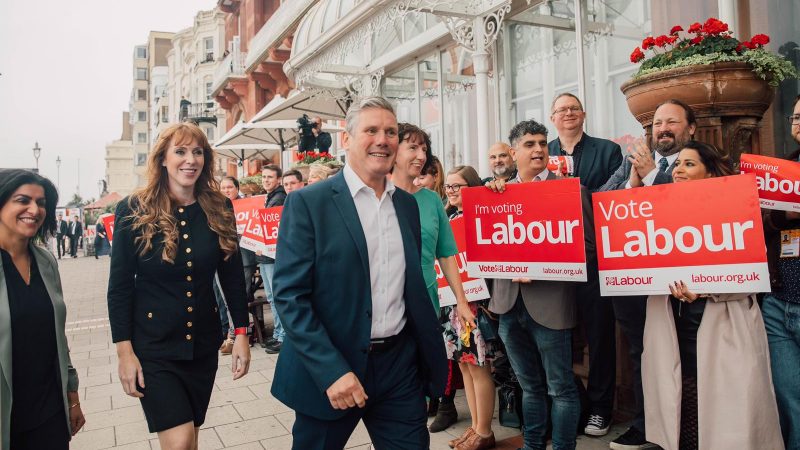
Keir Starmer’s Labour Party is on track to secure a 56-seat majority in the House of Commons, exclusive polling by Savanta for LabourList reveals.
According to a multilevel regression and post-stratification (MRP) model, Labour would secure 353 seats – an increase of 154 – while the Tories would lose 146 and return 211 MPs to parliament. The model indicates that the SNP would secure 48 seats (+4), the Lib Dems 15 (+1), Plaid Cymru three (+-) and the Greens one (+-).
Savanta found a 12-point lead for Labour, with 45% of people reporting that they would back Keir Starmer’s party in a general election compared to 33% who said the same of the Conservatives. 10% said they would vote Lib Dem, 3% Reform and 4% said they would support the Green Party.
The model suggests that, with the 12-point lead in the polls, Labour would regain many of the so-called ‘Red Wall’ seats – constituencies traditionally considered to be safe Labour seats but some of which returned Conservative MPs at the last election – including Ashfield, Bassetlaw, Blyth Valley, Sedgefield and Workington.
The seat-by-seat analysis also shows Labour taking seats held by prominent Conservative MPs: Welwyn Hatfield (Grant Shapps), Wycombe (Steve Baker), Wyre and Preston North (Ben Wallace) and Uxbridge and South Ruislip (Boris Johnson).
The polling did show some traditional bellwether constituencies not going Labour’s way, however, with the Conservatives holding on to the Dartford, Portsmouth North, Nuneaton and Great Yarmouth parliamentary constituencies.
Households struggling with the cost-of-living crisis were told by Liz Truss earlier this month that energy bills would be frozen at £2,500 per year. Starmer accused Truss of “loading the burden” on to working people by funding the cap from government borrowing. Labour has called for an expanded windfall tax to fund a cap.
According to Savanta’s research, a majority of voters in 279 of the 357 parliamentary constituencies currently held by the Conservative Party said that they trusted Labour more to manage policies related to the cost-of-living crisis.
Asked who would make the best Prime Minister, Liz Truss or Keir Starmer, the Labour leader outperformed Truss in 53 of the 357 constituencies currently held by the Conservatives, with the MRP model indicating that Labour would be the most likely winner in 52 of those at the next general election.
Truss performs better on this metric in a handful of seats, however, including Wakefield – where Labour recently regained the seat from the Tories following the resignation of disgraced former Conservative MP Imran Ahmad Khan.
Commenting on the findings, political research director at Savanta Chris Hopkins said that the analysis showed both the “potential and precarious nature of Labour’s polling lead at the moment”, highlighting that even a one-point shift away from the opposition could significantly reduce the majority.
“A one-point swing the other way could reduce [Labour’s] majority considerably, and any bigger swing back towards Liz Truss’ party could deprive Labour of a majority at all, even if their national vote share trumps the Conservative figure by eight to nine points,” he said.
“Labour need to hope that any Truss bounce is short-lived, and capitalise on an economic outlook that rarely rewards governing parties at the ballot box. If Labour can consistently generate double-digit poll leads over the government, Keir Starmer will be well on course for Downing Street, and therefore this conference feels a crucial moment in his leadership.
“He has an opportunity now to really differentiate Labour from the economic policies of a Truss-led government, and if he can convince voters that it is Labour, rather than the Conservatives, that have the answers to tackle the multitude of issues the country faces, the poll lead Labour have enjoyed throughout 2022 may start to feel more secure than it currently does.”
Savanta interviewed 6,226 GB adults aged 18+ online from September 15th to 16th 2022. Data were compiled in a MRP model by Electoral Calculus. Savanta ComRes is a member of the British Polling Council and abides by its rules.




More from LabourList
‘Council Tax shouldn’t punish those who have the least or those we owe the most’
Two-thirds of Labour members say government has made too many policy U-turns, poll reveals
‘Two states, one future: five steps on the path to peace for Israelis and Palestinians’